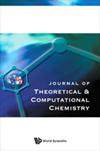Ab-initio binding of barnase–barstar with DelPhiForce steered Molecular Dynamics (DFMD) approach
IF 2.4
Q3 Computer Science
Journal of Theoretical & Computational Chemistry
Pub Date : 2020-06-01
DOI:10.1142/s0219633620500169
引用次数: 2
Abstract
Receptor–ligand interactions are involved in various biological processes, therefore understanding the binding mechanism and ability to predict the binding mode are essential for many biological investigations. While many computational methods exist to predict the 3D structure of the corresponding complex provided the knowledge of the monomers, here we use the newly developed DelPhiForce steered Molecular Dynamics (DFMD) approach to model the binding of barstar to barnase to demonstrate that first-principles methods are also capable of modeling the binding. Essential component of DFMD approach is enhancing the role of long-range electrostatic interactions to provide guiding force of the monomers toward their correct binding orientation and position. Thus, it is demonstrated that the DFMD can successfully dock barstar to barnase even if the initial positions and orientations of both are completely different from the correct ones. Thus, the electrostatics provides orientational guidance along with pulling force to deliver the ligand in close proximity to the receptor.barnase-barstar与DelPhiForce的Ab-initio结合引导分子动力学(DFMD)方法
受体-配体相互作用涉及多种生物过程,因此了解结合机制和预测结合模式的能力对于许多生物学研究至关重要。虽然存在许多计算方法来预测相应复合物的三维结构,提供单体的知识,但在这里,我们使用新开发的DelPhiForce引导分子动力学(DFMD)方法来模拟barstar与barnase的结合,以证明第一性原理方法也能够模拟这种结合。DFMD方法的重要组成部分是增强远程静电相互作用的作用,为单体的正确结合方向和位置提供引导力。因此,证明了DFMD可以成功对接barstar和barnase,即使两者的初始位置和方向完全不同。因此,静电提供了方向引导以及拉力,将配体运送到靠近受体的地方。
本文章由计算机程序翻译,如有差异,请以英文原文为准。
求助全文
约1分钟内获得全文
求助全文
来源期刊
CiteScore
1.70
自引率
0.00%
发文量
0
审稿时长
3 months
期刊介绍:
The Journal of Theoretical and Computational Chemistry (JTCC) is an international interdisciplinary journal aimed at providing comprehensive coverage on the latest developments and applications of research in the ever-expanding field of theoretical and computational chemistry.
JTCC publishes regular articles and reviews on new methodology, software, web server and database developments. The applications of existing theoretical and computational methods which produce significant new insights into important problems are also welcomed. Papers reporting joint computational and experimental investigations are encouraged. The journal will not consider manuscripts reporting straightforward calculations of the properties of molecules with existing software packages without addressing a significant scientific problem.
Areas covered by the journal include molecular dynamics, computer-aided molecular design, modeling effects of mutation on stability and dynamics of macromolecules, quantum mechanics, statistical mechanics and other related topics.

 求助内容:
求助内容: 应助结果提醒方式:
应助结果提醒方式:


